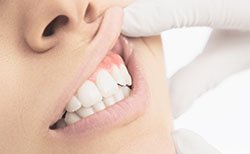Gum Disease

By now you know how important brushing and flossing are for your dental health. But, did you know that at-home dental care is much more than simply sweeping away the food and beverages that cling to your teeth?
Cause of Gum Disease
Bacteria in your mouth combine with food particles and mucus to form plaque. Brushing and flossing is essential in removing this plaque. If plaque is not removed, it eventually hardens into tarter, which must by professionally cleaned away.
As plaque and tarter sit on the teeth, the oral bacteria cause your gums to become inflamed and infected. Gingivitis is the mildest form of gum disease. If gingivitis is not treated, it may eventually advance into a more serious form of gum disease called periodontitis.
Additional Factors of Gum Disease
Poor oral hygiene, including skipped cleanings and poor brushing or flossing, is the leading cause of gum disease. However, there are other factors that can lead to gum disease, even with exceptional dental care.
- Smoking or using tobacco
- Misaligned teeth that prevent proper cleaning
- Pregnancy
- Hormonal changes
- Genetics
- Medication side effects causing changes in quality or quantity of saliva
Steroids, anti-epilepsy medications, oral birth control and cancer therapy drugs can all increase your risk of gum disease.
Warning Signs of Gum Disease
Since gum disease is typically painless, many people don’t realize they have a problem. This means that regular dental exams are important for diagnosis. However, there are other warning signs of gum disease. If you experience any of these symptoms, schedule a dental appointment today:
- Chronic bad breath
- Sensitive or loose teeth
- Red, swollen or bleeding gums
- Receding gums or teeth that appear larger than normal
- Pain during chewing
Impact of Gum Disease
If left untreated, gum disease can lead to both oral and physical health concerns. As bacteria, plaque and tarter build up and bacteria moves deeper into the tissue surrounding the teeth, bone loss may occur. As the bone that supports your teeth weakens, your teeth may become unstable or loose. This is your body’s way of riding itself of the infection, essentially shedding the teeth.
Aside from oral health, gum disease may play a role in other health concerns. As oral bacteria enter the blood stream, periodontal disease may increase your risk of:
- Diabetes
- Heart Disease
- Dementia
- Arthritis
Treatment of Gum Disease
Treating gum disease requires controlling the infection and removing the plaque and tarter that cause the problem. At Feels Like Family Dentistry, we use deep cleaning methods to remove tarter both above and below the gum line.
In addition to professional dental cleaning, your treatment plan may also include medicated mouth rinses and other prescription medications to help control the infection.
Treatment and prevention of gum disease requires a team approach to dental health. If you have experienced any symptoms of gum disease or if you want more information about preventing gingivitis, call us today to schedule an appointment.
Great staff and professional dental experts. Greeted me coming into the office and helped to mitigate any COVID -related restrictions. Once seated, I was treated like a family member during both my cleaning and dental exams. Love the hygienist and dentist, they were both gentle and helpful in determining an affordable course of action to restore my smile and tooth structure. Coming from another state, this really does feel like family and I think the level and cost of care are just right for me and my family. I am happy we decided to get our dental care here!!!








